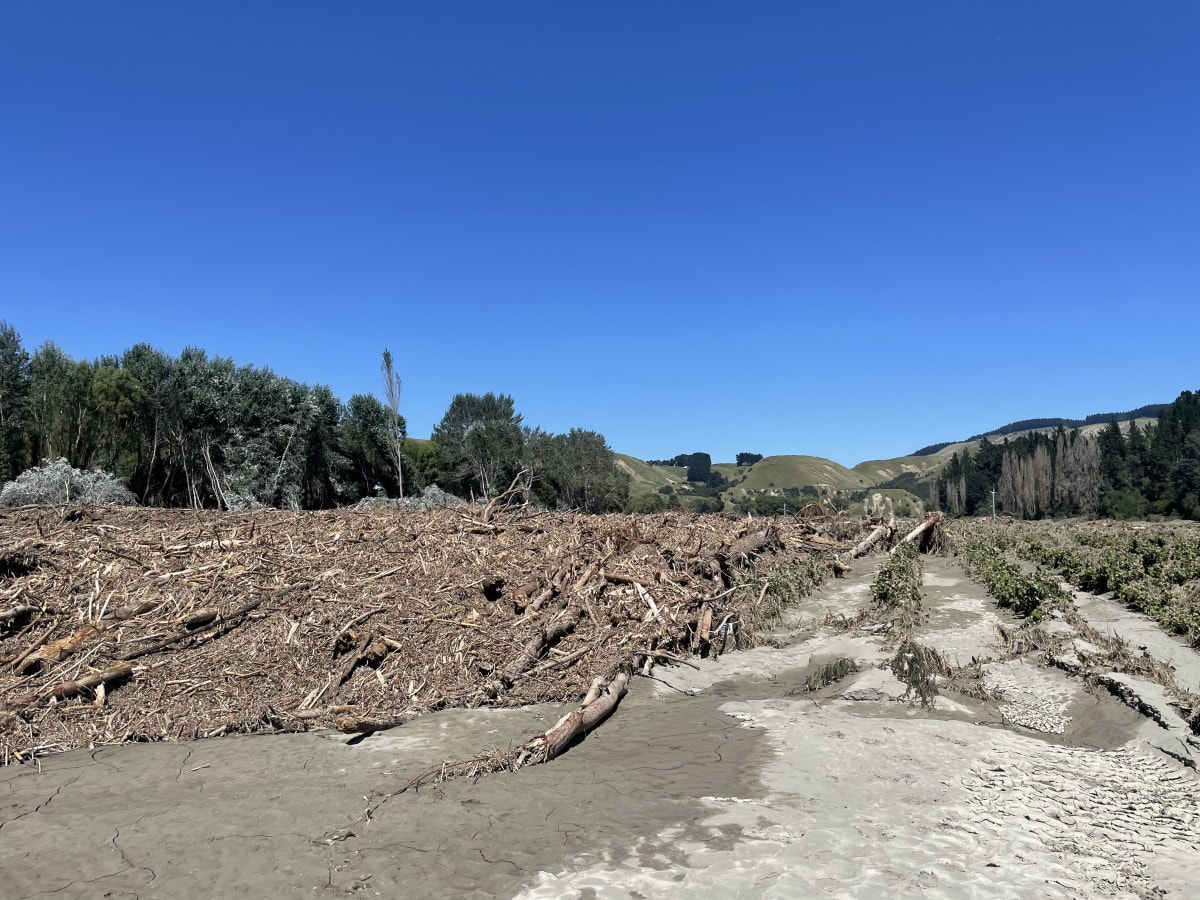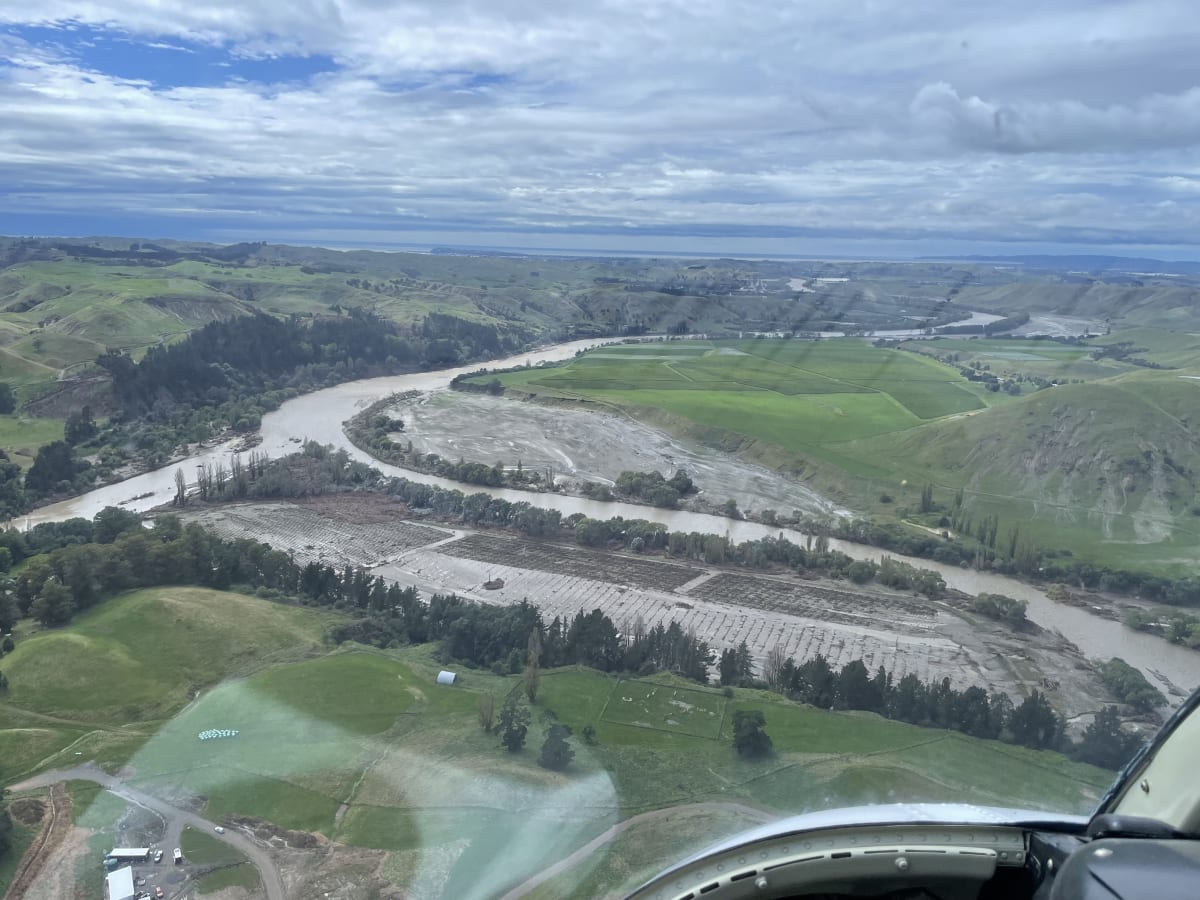
The Hawkes Bay wine industry, along with other primary producers in the area, faces a long road to recovery after Cyclone Gabrielle. Bonnie Sumner talks to a vineyard manager about why some local wines will be short supply for years to come.
Ben Poulter from Sacred Hill reckons wine growers in Hawkes Bay have lost around 500 hectares of grapes to Cyclone Gabrielle.
He stresses that’s not an official number – it’s hard to say when anyone can make that estimation given the destruction in the region. But it seems a fair guess, and it’s a number being bandied about a lot by those in the local industry.
“I don’t know if that’s 500 hectares that has been wiped out – or because you can’t harvest them because they’ve got contamination.”
READ MORE: * Central Hawkes Bay: 'It's still coming...' * Retreating home and business owners need publicly-funded compo
Depending on the 'yield' of the affected vineyards the lost production from Hawkes Bay could range from two million bottles of wine to more than eight million annually.
Hawkes Bay is New Zealand’s second biggest wine-growing region after Marlborough and an important centre of wine tourism.

Ben Poulter manages the vineyards owned by his family’s Sacred Hill wine business. They bought the well-known brand just a year ago.
When he says “wiped out”, Poulter is including one of their three vineyards in the area – a 20 hectare block of sauvignon blanc grapes in the Dartmoor Valley.
Poulter first tried to drive out there (about a half hour from Napier) the day after the cyclone to check on the state of the vineyard but couldn’t make it through severely ravaged Puketapu. “I couldn’t believe what I was seeing. I don’t even know how to explain it. Logs the size of buildings. I didn’t think I’d ever see that.”
In any case, the Puketapu Bridge was gone. Instead, he hired a helicopter, something he was reluctant to do at first.
“I felt a bit guilty taking a helicopter. The pilot said, ‘Well I can’t get a hold of anyone, so I can’t help anyone cause no one can contact me’. Because this was when there was no cell phone coverage. So he said, ‘I can take you or I can just leave the helicopter here'.”

Poulter recalls his reaction when he first saw the vineyard from above.
“Devastated. It’s quite sobering. Well it’s not a vineyard anymore, it’s just all silt. It’s extremely gutting, but then when you see all the damage to everyone else’s property, you can’t ask for sympathy. You’ve just gotta get on with it.
“Cause there’s a whole valley with the same problems if not worse. And I just feel for the people whose granddad started it, and then their dad, and then it’s them and there’s like a hundred years of farming and it’s just gone, like that.”
The other vineyard the Poulters own in Dartmoor Valley was far less affected, but now that the rain has returned “it’s not good”. Growers in Hawkes Bay just can’t catch a break, it seems.
“We don’t need any more rain. I think we recorded 600mm of rain on the vineyard that’s still standing, and that’s normally what you get in a year. I think the average rainfall Hawkes Bay is like 750mm or something and the forecast is for another 100mm.”

The timing of the cyclone has been one of the biggest gut punches for local growers because many were mere weeks or even days away from harvesting their crops. In Poulter’s case, they are meant to be harvesting their remaining vineyards in little more than a week.
“Once you get too much rot [from the poor weather] you lose the wine taste and you taste rot essentially. But we’re confident we won’t get to that point.”
What it does mean is they may have to harvest a little earlier.
“So it makes it more difficult and it puts more pressure on the people that have to harvest the grapes because they’ve got to harvest so much in a shorter period of time.”

They have a larger problem than that right now though – how to get the grapes out. The bridge that spans across the 30m-wide Mangaone River connecting the Rissington and Dartmoor communities to Hastings and Napier was washed out in the cyclone.
It didn’t take the community long to rig up a system to cross the river using an inflatable boat and a rope, and it means they can get people, generators, food and other supplies across – but obviously no machinery.
When he first set foot back on the vineyard Poulter couldn’t walk along where the previously uniform rows of vines were, so thick was the silt. He’ll need to get a bulldozer in there, and a digger to enable normal access.
Poulter says the cyclone has knocked output on that vineyard back four or five years. And the process to restore - and create better stopbanks and drainage - is so large it’s hard to know where to start.

So what does it all mean for New Zealand wine? “There’ll be a shortage on those grapes that those growers are growing. The wineries that source those grapes will also have shortages.”
The wine industry in Hawkes Bay faces a long road to recovery.







